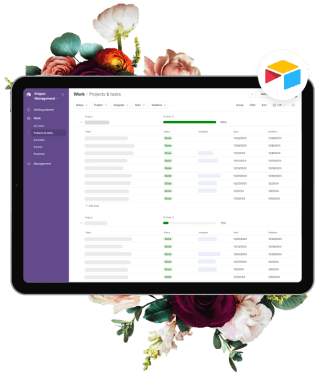As someone who’s relied on Airtable for years to keep my business organized and running smoothly, I know that a well-built Airtable template can save you hours (and a lot of headaches) every week.
But if you’re new to Airtable or just haven’t explored its full potential, you may be wondering what exactly it can do for you. This post is all about the five Airtable templates that have been absolute must-haves in my own business, from tracking sales to managing team tasks and more.
Ready to see how Airtable can change the way you work? Let’s dive into these templates, and if you want a more in-depth look at each of these, check out my free training!
My Top 5 Airtable Templates and Bases
1. Support Ticket Hub
Managing customer support is one of those tasks that’s easy to let slip through the cracks, but it’s crucial to keep things running smoothly.
That’s why my first go-to Airtable template is the Support Ticket Hub. This template is where all customer service questions go, creating a ticket for each one that can be assigned, tracked, and resolved — automatically notifying the customer along the way.
How It Works:
With this setup, every support request becomes a ticket in Airtable, letting your team members handle it (or notify you if it’s something you need to address). Automations also send out updates to customers, letting them know when to expect a response, so there’s no neto follow-up manually.
Why It’s a Must-Have:
Centralizing support makes everything so much easier. This template keeps support inquiries organized, prevents missed emails, and even makes it possible to fully outsource support if that’s on your radar.
Real-Life Example:
I’ve been using this setup for years, and it’s been a lifesaver. My VA handles everything, and the template helps her prioritize urgent requests or ones that need my input, so I only see what truly needs my attention. This alone has made my customer service a hundred times more efficient.
2. Team Task Manager
Even with a small team, keeping track of who’s doing what (and by when) can quickly get messy. The Team Task Manager template is my solution for assigning tasks, tracking progress, and automatically nudging team members if deadlines are coming up.
How It Works:
With this template, I can assign tasks to my VA, marketing assistant, or social media manager, including deadlines, instructions, and links to files — all in one place.
The best part? Built-in reminders mean that if something’s approaching a due date, Airtable sends an automated nudge to the person in charge. No need for me to check in manually.
Why It’s a Must-Have:
This setup keeps everyone in sync without needing endless email threads, Voxer messages, or repeated reminders. It’s a simple way to maintain a steady workflow and avoid miscommunications.
Real-Life Example:
In the past, I’d often send task requests through Voxer or DMs, but it was easy for things to get lost in the shuffle. Now, everything is logged in Airtable, making it easy to track what’s in progress, what’s completed, and what still needs attention.
3. Survey Hub
Feedback is gold when it comes to understanding your audience and refining your offers. My Survey Hub template has been instrumental in collecting testimonials, gathering customer feedback, and running post-purchase surveys.
How It Works:
Airtable’s form feature allows you to create custom forms that customers can fill out directly, feeding responses into your Survey Hub.
Whether it’s asking customers how they found your product, what they loved (or didn’t), or gathering questions before a live training, this template makes data collection simple and centralized.
Why It’s a Must-Have:
Having a dedicated place to collect and organize feedback not only helps improve your products, but it also builds a library of testimonials and valuable insights for future offers.
Real-Life Example:
For each workshop I run, I use this template to collect pre-session questions, letting me tailor my content to the audience’s needs. The feedback from this template has directly shaped my offerings, from tweaking training content to refining my marketing approach.
4. Product Tracker
If you’re a creator or business owner with multiple offers, keeping track of product details, pricing, and affiliate links can feel like juggling. The Product and Affiliate Hub template makes it easy to store and quickly access all product-related info in one place.
How It Works:
In this template, you’ll keep track of each product’s name, description, price, and links to sales pages or affiliate info. No more digging around trying to find the latest link or price — just open Airtable and have it all ready to go.
Why It’s a Must-Have:
Especially as your product line grows, a Product Tracker lets you avoid last-minute scrambling when a customer reaches out, or an affiliate needs a quick link.
Plus, with Airtable’s linking abilities, you can tie related products together, making it easy to track upsells, cross-sells, and product variations.

Real-Life Example:
This tracker is perfect for quick access to links and affiliate info. With dozens of digital products in my shop, it’s essential for staying organized. I can quickly pull the info I need without hunting around, which saves me so much time every week.
5. Automated Sales Tracker
Last but not least, my Sales Tracker in Airtable is the one that keeps me informed about what’s working (and what’s not) in my product lineup. This template helps track sales data and affiliate performance, giving me insight into top sellers and trends.
How It Works:
I set up automations to bring sales data from ThriveCart directly into Airtable. Learn how to do it with webhooks here, or use Zapier to bring the data in.
Once it’s in, I can filter data by product, sales volume, affiliate, month, quarter, year, coupon code, or any other metric I want to track. The template provides a big-picture view of how products are doing over time, making it easy to adjust my strategy based on performance.
Why It’s a Must-Have:
This template helps you keep tabs on your top products, spot trends, and identify which affiliates are driving the most sales. Having a clear overview of your performance data lets you make informed decisions, helping you optimize for better results.
Real-Life Example:
I’ve found this template especially useful for tracking sales trends. What kinds of products are selling better or worse this year, this quarter? I can quickly and easily see sales volume (quantity sold and/or revenue earned) by category and data period, so spotting trends is a whole lot easier.
Ready to Use Airtable to Simplify Your Business?
Each of these Airtable templates has played a major role in keeping my business running smoothly and efficiently. From automating customer support to organizing product details and tracking sales data, these templates cover a range of needs and give you a foundation for scaling without the stress.
Want to see how these templates work for my business? Check out my free training, where I’ll walk you through each template and talk more about how to set up powerful Airtable workflows in no time. Get instant access here!










